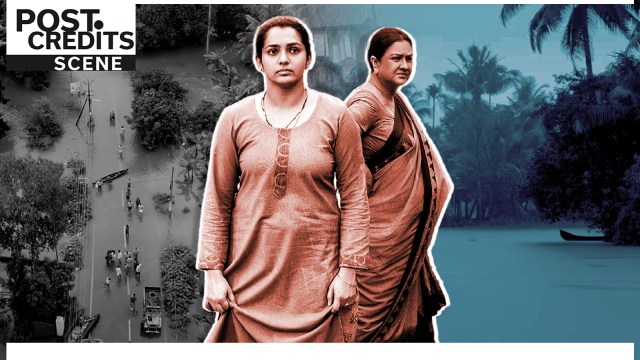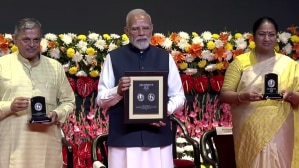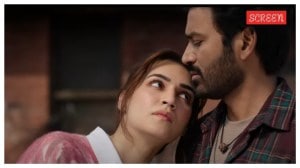There’s a reason behind this, of course — and we’ll get to it in a minute — but one artist has been routinely defying the tropes of mainstream Indian moviemaking, while invisibly elevating material to a level of excellence that would’ve eluded it otherwise. The new Malayalam film Ullozhukku, directed by Christo Tomy, is a claustrophobic psychological drama about two women trapped in man-made prisons both literal and imagined. It features a couple of incendiary central performances by Parvathy Thirovothu and Urvashi, themes that feel both evergreen and urgent, but the film’s real MVP is hiding in plain sight; or, at least, within earshot. Sushin Shyam has crafted a background score for the ages, music that takes ideas embedded deep inside Ullozhukku’s script, and brings them to the fore not with force, but with an arched eyebrow, a smile at the corner of the lips, a snarl of the nostril that can be felt before it is seen.

Also read – Manjummel Boys: A thrilling blockbuster about faith that doesn’t lean on religion as a crutch
Story continues below this ad
 Urvashi and Parvathy in a still from Ullozhukku.
Urvashi and Parvathy in a still from Ullozhukku.
Such is the impact of his score that it can probably qualify as the film’s third lead. It jostles for space alongside Anju (Parvathy) and Leelamma (Urvashi) as they sit on a rickety bed, fretting over their dying family member. It struggles for breath just like them when things become too overwhelming after he dies. The music joins them in moments of anxiety, fear, and frustration; often, it picks up on feelings even before they’ve had a chance to acknowledge them on their own. Like every good score, it aids the story without overpowering it; it highlights the performances without stealing the limelight for itself; it covers up the film’s flaws, but doesn’t demand credit.
A morality tale about the guilt that women are made to feel just for expressing basic desire, Ullozhukku traps Anju and Leelamma in a house together after Anju’s husband — Leelamma’s son — dies of a mystery illness. As they wait for his last rites to be completed amid an increasingly severe flood, old secrets come tumbling out of the closet. Anju never wanted to marry him in the first place, but was forced to by her domineering father, who forbade her from being with her college sweetheart. Almost immediately after her wedding, Anju was effectively reduced to a caregiver, devoting entire days to taking care of her bed-ridden husband. Leelamma never told him that he was going to die, perhaps because she didn’t want to admit it herself. But she effectively robbed Anju of her youth. When Anju’s former boyfriend suddenly resurfaces, however, she sees it as an escape route from her sorry life, and jumps headfirst into an affair. It’s a difficult brief to execute, but Shyam is able to elicit a sense of ominous tenderness as the affair snowballs into something bigger.
When Anju discovers that she is pregnant with her boyfriend’s child, the score underlines the turmoil that she is understandably going through, but a stray note of the piano gently reminds us that despite the less-than-ideal circumstances, a baby is on the way. These are complex emotions that most movies would shy away from. But having strong support empowers filmmakers to be bolder in their choices. Things become even more complicated when Anju’s husband dies — Shyam’s score in the hospital scene is timed to the sound of the machinery in the background — and Leelamma assumes that the child is his.
This is when Ullozhukku, like so many excellent new-gen Malayalam films, fully surrenders its genre impulses. At some point after the first act, it stops being a straightforward drama, and aided by Shyam’s music, digs into the thriller aspects of the story. One scene, in fact, is pure horror cinema, accompanied by cacophonous clanging in the background. This makes all the sense in the world, because Leelamma appears to be transforming into psycho before our eyes, while Shyam transforms into Bernard Hermann. He plays a tremendously important part in these tonal shifts, which could easily have been jarring in lesser hands.
Story continues below this ad
Because Indian film industries have a tradition of favouring soundtracks over scores, our mainstream movies are often lacking in an element that you’d imagine is a crucial part of cinema: musical themes. Films from Europe and the United States don’t normally feature original songs, and if they do, they’re usually played over the end credits. Western classical music is an important part of the culture, which is why the music in American and European cinema invariably revolves around a traditional orchestral score, dotted with melodies, motifs, and movements.
Even as technology has evolved, however, the structure and discipline remains largely intact. For instance, although Junkie XL devised the legendary Mad Max: Fury Road score as a rock opera, he honoured old-school arrangements in his compositions. As did Daft Punk in their now-iconic Tron: Legacy score, which combined the French duo’s signature electronic style with classical orchestrations. Even veteran composers such as Hans Zimmer and Danny Elfman — arguably the most famous of them all — have experimented liberally with tones and textures, but their music is rooted in the classical tradition.
In India, only the Malayalam industry is devoting the necessary time and effort into creating lush original scores for their movies. Barring a few exceptions, Bollywood films of a certain scale will typically have sound effects filling in for music, which points to a larger problem with Hindi cinema as a whole. The lack of confidence that filmmakers have in audiences is demonstrated not only by writing that spoon-feeds instead of sparking thought, but also in their use of music — sound effects don’t underscore emotion, they parade it naked in front of the viewer’s eyes, leaving them with no choice but to acknowledge it. Part of the fun of Shyam’s Ullozhukku score is how ambiguous it is.
Read more – Paradise: Darshana Rajendran’s thrilling Malayalam gem exposes the micro-aggressions of toxic men
Story continues below this ad
 A still from Ullozhukku.
A still from Ullozhukku.
In Tamil and Telugu cinema, on the other hand, film directors have practically surrendered to the power of the ‘BGM’. While their music admittedly features distinct themes — credit where credit is due, and all that — there is zero discipline in how these themes are implemented. For instance, the same eardrum-shattering tune is played every time Prabhas walks into frame in Salaar: Part 1 — Ceasefire. And Altee brought his own over-the-top sensibilities to crafting the sonic landscape of Jawan, in which instrumental versions of the original songs were used as the theme music for Shah Rukh Khan and Nayanthara’s characters.
In Ullozhuku, Shyam is able to capture Anju’s dormant rebelliousness, Leelamma’s regretful resignation, and the sense of entrapment that ultimately bonds both characters. From the feathery fluidity that he brought to Kumbalangi Nights — his breakout movie — to the rousing thrills of his Minnal Murali score, Shyam’s contributions to the countrywide success of Malayalam cinema cannot be overlooked.
Post Credits Scene is a column in which we dissect new releases every week, with particular focus on context, craft, and characters. Because there’s always something to fixate about once the dust has settled.




 Urvashi and Parvathy in a still from Ullozhukku.
Urvashi and Parvathy in a still from Ullozhukku. A still from Ullozhukku.
A still from Ullozhukku.































